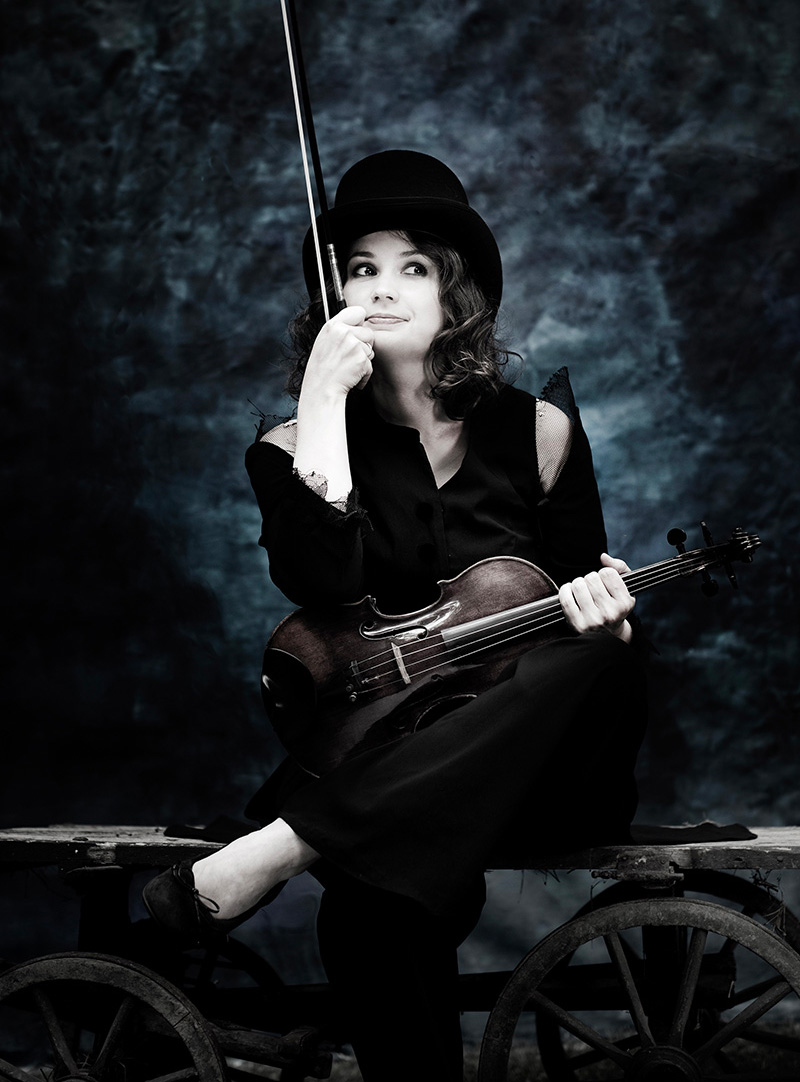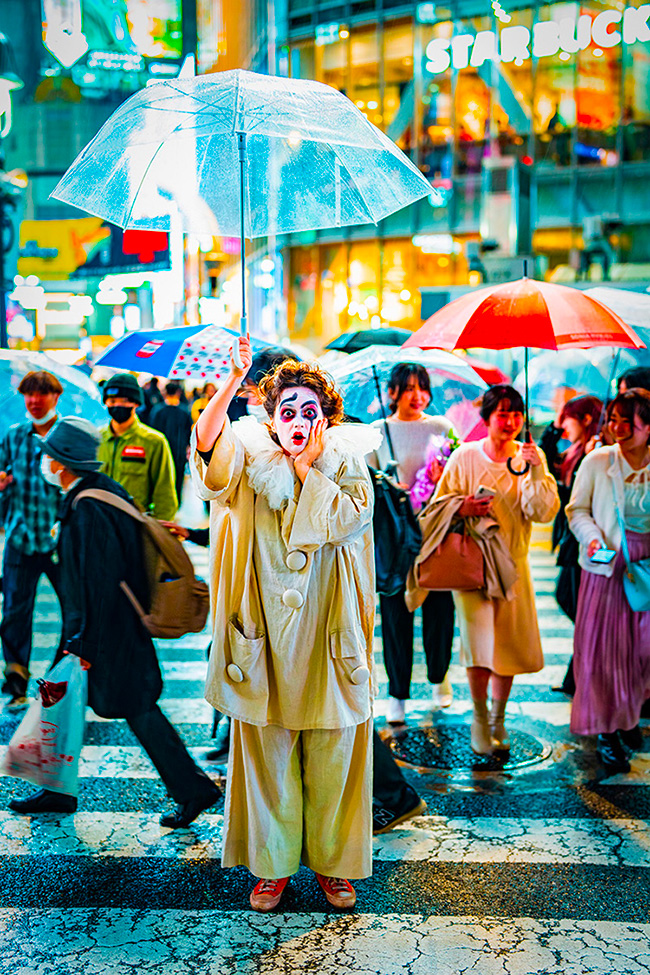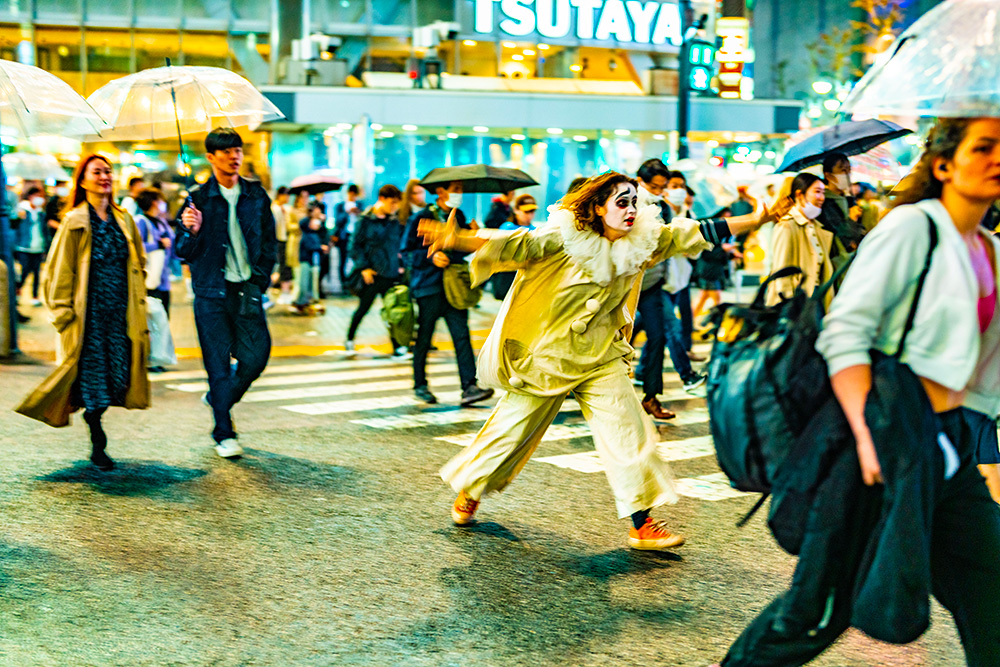Pierrot lunaire
Dear concert-goers,
We are very sorry to inform you that today’s pre-concert talk with Patricia Kopatchinskaja and Reto Bieri has been cancelled. Due to the demanding programme of Patricia Kopatchinskaja’s artistic residency in Prague, she has asked us to request your understanding, as she would like to focus entirely on tonight’s performance and tomorrow’s final recital. She presented the audience with a truly breathtaking concert yesterday, so we thank you for your understanding and look forward to seeing you at the concert. The doors of the Rudolfinum will open at 7 pm.
With best wishes,
The Prague Spring Team
Programme
- Igor Stravinsky: L’Histoire du soldat, suite
- Darius Milhaud: Jeu for clarinet and violin
- Béla Bartók: Contrasts for Violin, Clarinet and Piano
- Arnold Schönberg: Pierrot lunaire Op. 21
Performers
- Patricia Kopatchinskaja – recitation, violin
- Meesun Hong Coleman – violin, viola
- Júlia Gállego – flute
- Reto Bieri – clarinet
- Thomas Kaufmann – violoncello
- Joonas Ahonen – piano
The pre-concert talk was CANCELLED at the request of the artists, thank you for your understanding
“Something should happen in a concert. I don’t know what. But, every time, I’m expecting a miracle. I’m not very humble about this!” says Prague Spring Artist-in-Residence 2025, Moldovan-Austrian-Swiss violinist and performer Patricia Kopatchinskaja. The Guardian newspaper described what she’s like on stage, referring to her as “a coiled spring that could unwind in any direction”. PatKop, the nickname Kopatchinskaja gives herself, astonishes her audiences, not only when she walks onstage barefoot, but also with her imaginative, almost fanciful performances, such as Everyday Non-sense, Dies Irae, a response to the climate crisis and displacement, Bye-Bye Beethoven, Kafka Fragments and the Neo-Dadaist opera production Vergeigt. The recording of her own original project Death and the Maiden won a prestigious Grammy award in 2016. The exceptional talent of this artist is also reflected in numerous residencies at such institutions as London’s Southbank Centre and Barbican Centre, Vienna’s Konzerthaus, and the Elbphilharmonie, and in her collaboration with some of the world’s finest orchestras, including the New York Philharmonic, the London Symphony Orchestra, the Royal Concertgebouw Amsterdam and the Berlin Philharmonic, where she was Artist-in-Residence and appeared with them alongside Chief Conductors Sir Simon Rattle and Kirill Petrenko. Not only is Kopatchinskaja a violinist, singer, actress, and professional composer, but she has also become an assiduous and highly successful promoter of contemporary music since, as she states herself: “Of course, you read today’s (and not yesterday’s) papers.” She works with composers such as György Kurtág, Michel van der Aa, Márton Illés, Thomas Larcher and Esa-Pekka Salonen, and she is also Artistic Partner of the SWR Experimental Studio, one of the most important international research centres in the field of electronic music.

Patricia Kopatchinskaja was given her first violin at the age of six, while the family were still in her native Moldova. When she was twelve years old they all emigrated to Vienna where, at 17, she was accepted to the University of Music and Performing Arts. At the age of twenty-one she received a scholarship to study at the Hochschule der Künste in the Swiss city of Bern, which ultimately became her second home. Her international career sky-rocketed when she won the prestigious Credit Suisse Young Artist Award in 2002. “Patricia doesn’t believe that music has to be beautiful – perhaps this is one of the things that makes her controversial – she seems to believe that music is a representation of the realities of life – from fantasy to brutality,” wrote American violinist Anthea Kreston on the slippedisc.com website. “I don’t want people sipping beer while they’re listening to Shostakovich. I want people to feel real pain, I want them to succumb to their imagination. I want to delve deeper into their souls,” Kopatchinskaja herself adds. Her three contrasting programmes at the Prague Spring, during which the music of outstanding Czech composer Luboš Fišer plays an intriguing role, will certainly appeal to anyone who’s looking to experience something far from the ordinary.
“You can’t really understand it. And you don’t have to. It is tone-painting, musical rhetoric. The piece feels close to life and to the world of dreams,” states Patricia Kopatchinskaja on the Symbolist work Pierrot lunaire. Arnold Schönberg (1874–1951) wrote the piece in 1912 to selected poems from the collection of the same name by Albert Giraud. Instead of sung texts, however, here he applied the technique known as Sprechstimme (“speech-voice” or spoken voice), where the reciter keeps to the prescribed rhythm, while the notes are only approximated; the vocalist uses the specified pitches but does not sustain them, allowing them to drop or rise, in the manner of speech – and this in an endeavour to create an emotively intense expression along with a sense of immediacy. “I feel to be on a path towards a new way of expression, in which sound becomes an immediate, naturalistic reflection of man’s internal world,” Schönberg wrote in the year he composed the work. In Pierrot Kopatchinskaja won’t be playing the violin: she’ll be taking on the main spoken role, which she has already performed in the past in association with members of the Berlin Philharmonic, the Gothenburg and Montreal Symphony Orchestras and also the Asko/Schönberg Ensemble in Rotterdam. She is coming to Prague with a group of fabulous instrumentalists, musicians with whom she recorded this groundbreaking work in 2021 for Alpha Classics. “Being part of this lineup is a dream come true,” pianist Joonas Ahonen noted after the recording – incidentally, Ahonen is a former member of an ensemble familiar to Prague Spring audiences, Klangforum Wien. Pierrot lunaire has only been performed twice at the Prague Spring, in 1965 and in 2006, the latter performance involving members of Ensemble intercontemporain joined by Hilary Summers. Almost twenty years on, the Prague Spring on this occasion has entrusted the presentation of this remarkable work to the singular talent and artistic versatility of Patricia Kopatchinskaja and her colleagues. Of course, it wouldn’t be PatKop, as the Moldovan native is known to the entire music world, if she didn’t approach the work in her own distinctive way. She will appear in a Pierrot costume on a specially illuminated stage, bringing her fellow performers together in a quasi theatrical production.

Let’s also take a look at the other three remarkable parts of the programme, where Patricia Kopatchinskaja will assume the role of chamber player: L’Histoire du soldat (Tale of the Soldier) by Igor Stravinsky (1882–1971) – a parable about a soldier who makes a pact with the devil, agreeing to part with his violin in exchange for a magic book promising untold wealth; Bartók’s popular Contrasts, in which the Prague Spring Artist-in-Residence will perform on a retuned violin; and Jeu from Suite for violin, clarinet and piano by Darius Milhaud (1892–1974), a pioneer in jazz and polytonality in classical music. Inspiration from jazz and folk music is what brings all three works together, even in the case of Béla Bartók (1881–1945), who was commissioned to write Contrasts by jazz clarinetist Benny Goodman. The lyrical episode in the final movement in 13/8 time is reminiscent of a delicate, sophisticated rumba. We have a treat in store with a wonderful evening of wonderful music!








